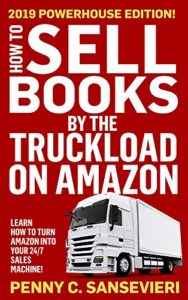 by Penny Sansevieri
by Penny Sansevieri
I love goals. I love them so much that I actually have a goal book, like a journal, where I keep all of my goals. I’m actually kind of addicted. And like every author out there, I want to sell more books.
Creating goals that actually contribute to efforts to sell more books is much more complex than most authors realize. Luckily I can break it down for you, and I know it will change your approach to book promotion.
One thing is very clear: anything you do around goal-setting has to be insanely specific.
All goal-setting books will tell you the big picture, nebulous goals like “I want to sell more books” won’t help you reach the finish line.
When I speak to authors on the phone or in person, I always ask them what their goals are.
Sometimes I get super-specific answers, but in most cases authors say, “I want to sell more books!” And while selling books isn’t a bad goal, it’s a big-picture goal that won’t get you to where you need to be.
If you have no direction other than to sell books, you’ll often make bad decisions, spend money you shouldn’t on strategies that aren’t improving your discoverability, and end up nowhere near the end goal of selling more books, because the end goal is achieved through an aggregate of hundreds or maybe thousands of individual book-promotion elements that result in more book sales.
Creating the Path to Book-Sales Success
Let’s break this down and start creating a path to success; for example, let’s say you have written a mystery novel. It has a great cover and the reviews have been good, but it’s not really moving the needle on book sales. So what can you do? Let’s take a look at this more closely.
End Goal: BOOK SALES
Often I look at what promotion elements the author hasn’t been doing. Let’s say the author hasn’t done an eBook promotion in a while. Since his market is very eBook-centric, that could be a good place to start. So let’s add eBook promo to the list. Now we have:
eBook Promo = Sell More Books
What else can the author do? Maybe the author hasn’t started building a mailing list yet, so let’s add that to the list.
Mailing list > eBook Promo = Sell More Books
But that’s really not enough. Is the author on Goodreads? If not, let’s plug that in. And while we’re at it, maybe he should do a giveaway there, too!
Goodreads > Mailing List > eBook Promo = Sell More Books
Getting the idea?
So, each bigger goal is a combination of a series of smaller goals that lead you to bigger sales (or whatever you’re trying to obtain).
End goal: SPEAKING EVENTS
Let’s say you don’t care about book sales, but you really wrote your book to get more speaking events. What would that look like for you?
Using Speaking Events as your big-picture goal, what does it take to book them? Well, you need some experience. So let’s start with some smaller gigs around town, in bookstores or wherever is most appropriate to your book. Chamber of Commerce meetings, perhaps? You get the idea.
Local Events = Big Awesome Speaking Gigs
Local events alone aren’t going to land you a big keynote speech. You’ll need more for that. What about a speaker one-sheet? A one-sheet is a page all about you, your speaker topics, and bio. Ideally, it includes blurbs from people who have heard you speak and who were in awe of your topic and delivery. So then we have:
Speaker One-Sheet > Local Events = Big Awesome Speaking Gigs
What if you need experience beyond local events? Have you ever spoken in public before? If not, you can attend a local Toastmasters group. You don’t have to go to a lot of them, but enough to get your sea legs. Now your new action list looks like this:
Toastmasters > Speaker One-Sheet > Local Events = Big Awesome Speaking Gigs
Identifying Your Goals
Running through the process in this article is one thing, but coming up with it on your own is an entirely different matter. Believe me, I appreciate how difficult this can be.
More Social Engagement
First you need to read up on what that requires, because it changes all the time. I encourage you to visit the “for business” resources for the social media platforms you want to focus on. “Instagram for Business” or “Facebook for Business” are great examples. You are not only guaranteed to get the most up-to-date information on using the platform and all the features, but I guarantee you’ll learn a lot about what works best.
Platform Research = More Social Engagement
Social engagement is also about networking. By keeping an eye on your competition, you’ll learn a lot about what’s working for them. Plus, you can foster relationships for shared exposure. You’ll also want to figure out who you need to be following and networking with.
Networking Research > Platform Research = More Social Engagement
Research does nothing without some sort of structure to execute everything you’ve learned. I suggest starting with a Monthly Book-Marketing Planner to establish a recurring plan of action.
Establish a Recurring Action Plan > Networking Research > Platform Research = More Social Engagement
Now the plan needs details.
Use what you learned during your research. It might be asking more specific questions, getting feedback and opinions, doing polls, posting more video, etc.
Decide exactly what you’re going to do. Work on some videos, outline your polls and some great questions, or wherever you need to put the time in. Then, put it all in a bank you can continually feed, so you’re never left staring blankly at your computer wondering what to post.
Create Some Advance Content > Establish a Recurring Action Plan > Networking Research > Platform Research = More Social Engagement
Now You’re Ready to Roll
Now you have an idea of how to create a list, or a pathway, for your goals, and you should have a better idea of what you need to get to your final, big-and-awesome goal, like selling more books.
 That’s the point of this whole exercise.
That’s the point of this whole exercise.
You must break down the specific things you need to do, or the pieces that are missing from your promotion, before you spend any money on book marketing.
Why?
Because you can waste a lot of money doing things that won’t necessarily help you gain more readers, or sell more books, or whatever your big-picture goal entails.
Also, breaking big goals into small, manageable pieces makes it incrementally easier to manage on a day-to-day basis. If you’re hiring out your marketing, it’s easier when you know specifically what you need. That way you aren’t spending money on a bunch of things that may or may not get you to where you want to be.
Penny Sansevieri, CEO and founder of Author Marketing Experts, Inc. (AME) and an adjunct professor at NYU, is a best-selling author and internationally recognized book marketing and media relations expert. Her company is one of the leaders in the publishing industry and has developed some of the most cutting-edge book marketing campaigns.
